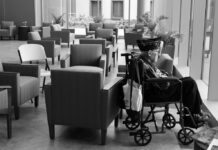The Mind-Expanding Ideas of Andy Clark
In this piece for The New Yorker, Larissa MacFarquhar profiles the philosopher and cognitive scientist Andy Clark, whose work argues that our minds are inseparable...
SSRIs Significantly Increase Falls in Dementia, Even at Low Doses
Researchers in the Netherlands followed 248 nursing home residents with dementia for two years, finding that even 25% of the defined daily dose of...
New Medications Fail to Show Efficacy for Alzheimer’s Disease
Three phase III clinical trials assessing the efficacy of Lundbeck’s investigational drug idalopirdine for Alzheimer’s disease have failed
Drugs and Dementia
This week, JAMA Internal Medicine published online an interesting paper, “Cumulative Use of Strong Anticholinergics and Incident Dementia: A Prospective Cohort Study.” They found that exposure to anticholinergic drugs significantly increased the risk of developing dementia. This study has important implications for those who prescribe and take psychiatric drugs.
Benzodiazepines Linked to Increased Risk of Alzheimer’s: Causation or Not?
According to a study in the British Medical Journal, benzodiazepine use is associated with a significantly increased risk of developing Alzheimer’s disease. Some experts...
Antipsychotic Use in Nursing Homes Causing Many Adverse Effects in Elderly
A literature review found that the extensive off-label use of antipsychotic medications in nursing homes is causing many adverse effects and providing limited benefits.
Assessing the Cost of Psychiatric Drugs to the Elderly and Disabled Citizens of the...
ProPublica is well known for creating interesting data bases that allow anyone hooked up to a computer to see by name whether a physician is accepting Big Pharma payments — from dinners to speaking engagements to consulting services. What may be lesser known is that occasionally ProPublica will publish other data that when carefully mined can reveal even more about the use of psychiatric drugs especially when there is a public funding source available.
Antidepressant Use Associated with Brain Atrophy and Lesions in Elderly
In a study of 630 elderly Manhattanites without dementia, researchers from the Netherlands found that antidepressant use was associated with significantly more brain atrophy,...
Risk of Death in the Elderly Trebled With Antipsychotics
In a nine-year study of all 2,224 residents of Leppävirta, Finland who were 65 years old or older, researchers found that the 332 residents...
Common Alzheimer’s Drug Linked to Potentially Life-threatening Conditions
A popular Alzheimer's and dementia drug has been linked to two potentially fatal conditions.
Assessing Increased Mortality Risks of Antipsychotics and Mood Stabilizers in Dementia
An article in January's American Journal of Psychiatry weighs the relative risk of mortality associated with various antipsychotics and mood stabilizers used in the treatment of...
Veterans with both PTSD and Dementia More Likely to be Prescribed Antipsychotics
Researchers found that veterans with both conditions had higher odds of being prescribed second-generation antipsychotics than those presenting with just PTSD.
Policies to Reduce Antipsychotic use Among Elderly are Failing
Research reveals that rates of antipsychotic prescribing to the elderly in the UK have not dropped despite national recommendations.
No Evidence For Antidepressants in Depression With Dementia
In a review and meta-analysis of double-blind, placebo-controlled, randomly-assigned trials of antidepressants marketed in the U.S., researchers at the University of California failed to...
PTSD and Psychiatric Medication Linked to Dementia in Older Veterans
Veterans diagnosed with PTSD and taking SSRIs, novel antidepressants, or atypical antipsychotics are more likely to develop dementia.
Still Mistreating the Elderly with Psychiatric Drugs: Antipsychotics
The percentage of seniors in the United States prescribed potentially deadly antipsychotic drugs increases with age. A new study reveals that in the face of serious risks of strokes, fractures, kidney injuries, and death, over seventy-five percent of seniors given antipsychotics do not have a diagnosis for a mental disorder.
Dementia Screening Tools Often Misdiagnose Patients
A new study has found that the three most commonly-used dementia screening measures often misdiagnose patients.
Certain Antidepressants, Sleep Aids Associated with Higher Dementia Risk
Greater cumulative doses of drugs that are anticholinergic or block the neurotransmitter acetylcholine are associated with significant increases in dementia and Alzheimer's.
Deadly Drugs Misused in U.S. Nursing Facilities
From AARP: The family of Bobby Glenn Tweed recently settled a lawsuit with a nursing home over his wrongful death. Tweed was prescribed psychotropic drugs without...
Benzos Raise Dementia Risk 50%
A 15-year prospective study, in the British Medical Journal this week, of 1063 subjects by researchers from the University of Bordeaux and Harvard University...
AARP Joins Antipsychotic Lawsuit Against CA Nursing Home
The AARP has joined an "unprecedented class-action lawsuit" against a California nursing home accused of using antipsychotics without informed consent from residents or family...
England Seeks to Stop Antipsychotics For Dementia
English health minister Paul Burstow is seeking to outlaw the 'silent scandal' of inappropriate antipsychotics for dementia by proposing legislation that imposes up to...
Depression Linked to Dementia in Later Life
A retrospective study of 13,535 long-term Kaiser Permanente members found that depressive symptoms in mid-life (1964-1973 for this cohort) were associated with a 20%...
Almost No Nursing Homes Meet Federal Standards for Antipsychotic Use
The Office of the Inspector General finds that 99.5% of nursing facilities in the United States are non-compliant regarding federal regulations concerning antipsychotic use....
Antipsychotics for Dementia: Not Justified and Risky
In a study of antipsychotics used to treat 75,445 patients in nursing homes in the United States, researchers from Harvard Medical School, Columbia and...
















